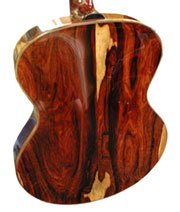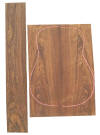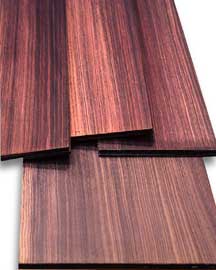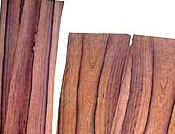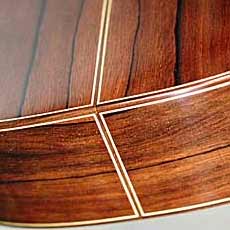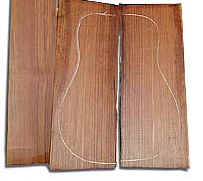|
 Amazon rosewood (Dalbergia spruceana): Amazon
rosewood is hard and heavy—the same density as cocobolo, but
easy to glue, and doesn't clog sandpaper. Excellent tap
tone, and requires no CITES docs, as do most of the other
Central and South American rosewoods. It does have a
tendency to end check, and because of that we air-dry it
rather than kiln dry it.
Amazon rosewood (Dalbergia spruceana): Amazon
rosewood is hard and heavy—the same density as cocobolo, but
easy to glue, and doesn't clog sandpaper. Excellent tap
tone, and requires no CITES docs, as do most of the other
Central and South American rosewoods. It does have a
tendency to end check, and because of that we air-dry it
rather than kiln dry it. |
 Indian rosewood: considered the best
value in rosewoods and probably in backs and sides altogether.
Became the replacement wood for Brazilian as Brazilian became
scarce. Most stable of rosewoods. Easy to work, to bend, to glue,
etc. years. Considered sustainable: used to shade coffee and tea
fields.
Indian rosewood: considered the best
value in rosewoods and probably in backs and sides altogether.
Became the replacement wood for Brazilian as Brazilian became
scarce. Most stable of rosewoods. Easy to work, to bend, to glue,
etc. years. Considered sustainable: used to shade coffee and tea
fields. |
 Madagascar rosewood:
there are many species and subspecies of
Madagascar rosewood. The trees of the various species are small
and rarely yield quartersawn 2-piece backs. During my tenure at
LMI, wide bass fingerboards were resawn by many to make 4-piece
quartersawn backs. With enough spider webbing, given similar
color, and with good joining, it's virtually impossible to tell
whether the back is of 2 or 4-pieces. Similar to Brazilian in
stability once dry, about the density of cocobolo (at least the
variety we have) perhaps a little less porous, Madagascar rosewood makes great
sounding guitars.
Madagascar rosewood:
there are many species and subspecies of
Madagascar rosewood. The trees of the various species are small
and rarely yield quartersawn 2-piece backs. During my tenure at
LMI, wide bass fingerboards were resawn by many to make 4-piece
quartersawn backs. With enough spider webbing, given similar
color, and with good joining, it's virtually impossible to tell
whether the back is of 2 or 4-pieces. Similar to Brazilian in
stability once dry, about the density of cocobolo (at least the
variety we have) perhaps a little less porous, Madagascar rosewood makes great
sounding guitars. |
 Cocobolo rosewood:
grows from Mexico through Central America.
Harder and heavier than the three previously described rosewoods,
Cocobolo can also be waxy and difficult to glue. However, for
several of the hand builders (e.g. Jose Oribe) it has taken the
place of the previously hard-to-get Brazilian rosewood. Available
in quartersawn sets, Cocobolo often displays some
spider-webbing, but the norm is straight, fine grain.
Cocobolo rosewood:
grows from Mexico through Central America.
Harder and heavier than the three previously described rosewoods,
Cocobolo can also be waxy and difficult to glue. However, for
several of the hand builders (e.g. Jose Oribe) it has taken the
place of the previously hard-to-get Brazilian rosewood. Available
in quartersawn sets, Cocobolo often displays some
spider-webbing, but the norm is straight, fine grain. |


